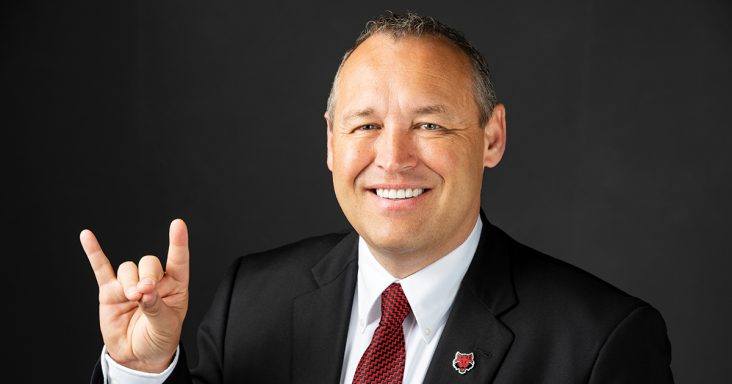Fewer students, higher expectations shaping future of ASU
by August 20, 2019 6:19 pm 929 views

Predicting the future can often be a fool’s errand, but in the world of higher education, administrators have little choice. Online classes are booming, tuition rates are constantly on the rise, and state and federal government support has been on the decline for the last several years. There’s also a growing perception that a college degree isn’t as valuable as it used to be.
Arkansas State University Jonesboro Chancellor Kelly Damphousse told Talk Business & Politics he expects dramatic changes in higher education in the coming decades. What will happen is still an unknown, but colleges and universities will look different than the traditional model that has dominated for the last couple of centuries.
“I think about this a lot … there seems to be a growing concern about the value of a college education,” he said. “We have to do a good job of explaining the value of a college education. It’s an investment.”
One area that is predicted to be radically different is online course offerings. ASU already has about 5,000 online students, and that number is expected to grow. There are several factors that are fueling this trend, Damphousse said. One is the convenience of scheduling classes around work or other activities. Another factor is that online classes allow more non-traditional students access to college without the burden of having to travel long distances to physical campuses.
Despite this trend, the chancellor said he thinks a brick-and-mortar college experience is still worth the cost to a lot of students coming out of high school. He said he expects a slowdown in construction projects on college campuses; the rapid growth of physical structures over the past 50 years will curtail due to the changing lifestyles for learning.
A key to that will be reaching middle and high school students and explaining the benefits of living on campus and what campus life is like, he said. Damphousse himself never intended to go to college when he was in high school, but he saw a poster of a college on a wall once and it made him reconsider.
“There are a lot of students that have no idea how enriching campus life can be,” he said. “There’s something special about being a part of a college campus.”
ASU has focused on recruitment and retention in recent years and is working more closely with local high schools. ASU began to revamp its recruiting and retention efforts after it had a smaller-than-expected incoming freshman class in 2017, and retention numbers had been lower than projected. Both rebounded in the fall of 2018.
Arkansas State reported 1,565 first-time, first-year students, up 9.7% from 1,426 in 2017. Included in this year’s freshman numbers are 50 international students, a 51% increase over last year, up from 33 in 2017.
ASU had an overall enrollment head count of 14,058, which includes students at the Jonesboro campus as well as students enrolled at Campus Queretaro in Mexico (349 students), marking the third consecutive year with enrollment over 14,000.
Earlier this year, the school announced significant changes to its recruitment and retention programs. It renamed and repurposed the university’s Office of Admissions under Vice Chancellor for Enrollment Management Dr. Bryan Terry. All current recruiters now become admissions counselors, with operations of the office to be directed by a new senior director of admissions.
Terry focuses on the entire cycle of the individual student, from the moment of interest in ASU through admission and matriculation toward graduation and retention into the Alumni Association.
Part of the school’s strategy moving forward will also include an aggressive push towards non-traditional and transfer students. ASU has recently entered into a number of partnerships with other higher education institutions. The goal is to lure students who have received or have worked towards their two-year degrees to working toward their four-year degrees at ASU.
ASU is developing one of the best online course offerings in the state, Damphousse said. Potential students that live 40, 50, even 60 miles away from the ASU campus can still receive a high quality education, he added.
“We want to help people that are place and time bound,” he said.
The types of classes that will be offered in the future will be modified, too. There were a lot of students who in the past chose degrees based on personal enrichment, but most students now are evaluating a degree based on its earnings potential in the future. Agriculture manufacturing, robotics, engineering, tech, computer science, and other disciplines will expand in the coming years as will health-related degree programs.
Birth rates have been in decline, meaning there will be fewer students to recruit in the future, Damphousse said. It’s unlikely that the state or federal government will increase spending in higher education, so it will be imperative to drive home the return on investment that a college degree provides. Those with a college degree significantly out earn those with only a high school diploma, he added.
No matter what the future holds, the ASU-Jonesboro campus chancellor thinks his institution will continue to grow and thrive in the years to come.
“We have a real noble mission in the upper Delta,” he said. “College is an option. College is affordable. It’s a good idea.”
